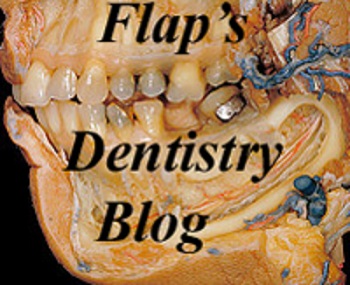
Good Wednesday morning!
On to today's dentistry and health headlines:
Cavity-Proof Teeth: 'Keep 32' Molecule Kills Bacteria That Can Cause Tooth Decay
Study: Heavy cellphone use affects salivary glands
Pennsylvania Dental Association Applauds New Law Designed to Help Patients With Developmental Disabilities and Young Children
On to today's dentistry and health headlines:
Cavity-Proof Teeth: 'Keep 32' Molecule Kills Bacteria That Can Cause Tooth Decay
Two scientists have discovered a molecule that kills the bacteria that can cause tooth decay, meaning a treatment for cavity-proof teeth could be on the way.
Jose Cordova of Yale University and Erich Astudillo from the University of Chile named the molecule "Keep 32" -- a reference the number of teeth in the human mouth -- and now the duo is waiting to begin performing trials on humans, Gizmodo reports.
The molecule targets Streptococcus Mutans, the bacteria that turns sugar into the lactic acid that affects tooth enamel and can lead to decay, Geek.com explains.
The researchers say the molecule -- which could be incorporated into products like mouthwash or candies -- could kill bacteria in about 60 seconds.
According to Science Daily, Americans spend about $70 billion on dental care each year. And worldwide, about 73 percent of the world's population has cavities, according to Chile's Diario Financiero. The scientists began conducting research in 2005 in order to find a way to reduce that number.
The researchers say they already have a number of parties interested in investing the product or buying the patent, and they hope to have a product on the market in 14 to 18 months, pending proper funding and the results of the trials, Diario Financiero reports.
Study: Heavy cellphone use affects salivary glands
Heavy cellphone use increases the rate of saliva and flow, as well as the volume of parotid glands, according to a study to be published next month in Oral Surgery, Oral Medicine, Oral Pathology, Oral Radiology (August 2012, Vol. 114:2, pp. 200-206).
Researchers from the department of oral medicine and radiology at Vidya Shikshan Prasarak Mandal's Dental College and Research Centre in India were interested in looking at how heat and radiofrequency radiation that cellphones emit can impact adjacent tissues.
"Mobile phones are known to generate heat and emit radiofrequency radiation in the form of nonionizing electromagnetic radiations in the range of 800-2,200 MHz, similar to many home appliances," they wrote. "But the long duration and proximity of mobile phones to human body during use has given rise to concerns of possible adverse effects resulting from absorption of these emissions by the tissues adjacent to the area of mobile phone handset use."
Because the parotid glands are located in front of the ear in close proximity to where cellphones are held when in use, these glands in particular could be vulnerable to adverse effects, the study authors noted.
Previous studies have had considerable variation in their conclusions, suggesting or denying a correlation between heavy cellphone use and headaches, migraines, brain tumors, auditory canal pathologies, and physiologic changes in the salivary glands, they noted.
Pennsylvania Dental Association Applauds New Law Designed to Help Patients With Developmental Disabilities and Young Children
The Pennsylvania Dental Association (PDA) commends the General Assembly and Governor Corbett for passing and signing into law legislation (House Bill 532) requiring insurance companies to cover the costs of general anesthesia for young children and patients with developmental disabilities.
Many young patients and those with mental or physical disabilities often experience stress when visiting a dentist's office. Some patients require general anesthesia before a dentist can treat them. However, many insurers have refused to cover the cost of anesthesia for dental patients. If a parent or caregiver cannot afford the cost, it could result in a patient delaying treatment or neglecting oral health. This could lead to a much greater cost, both in terms of money and in health. Small cavities that go untreated can develop into big problems.
House Majority Whip Stan Saylor, R-York, who sponsored HB 532, said, "The fact of the matter is that when insurance companies refuse to cover anesthesia for children and special needs patients, it is equivalent to denying them oral health care."
UAMS starts up Dental Education Center in LR
A new Dental Education Center that’s opening at the University of Arkansas for Medical Sciences is part of the medical school’s effort to make more dental care available in the state.
UAMS announced Monday that the center will include an oral health clinic and post-graduate programs for dentists in advanced general dentistry and oral surgery.
Arkansas does not have a dental school and UAMS says the state ranks 50th among states in the number of dentists available per 100,000 in population.
Officials say that the post-graduate program will attract dentists who will be more likely to stay in Arkansas.
Enjoy your morning!
No comments:
Post a Comment